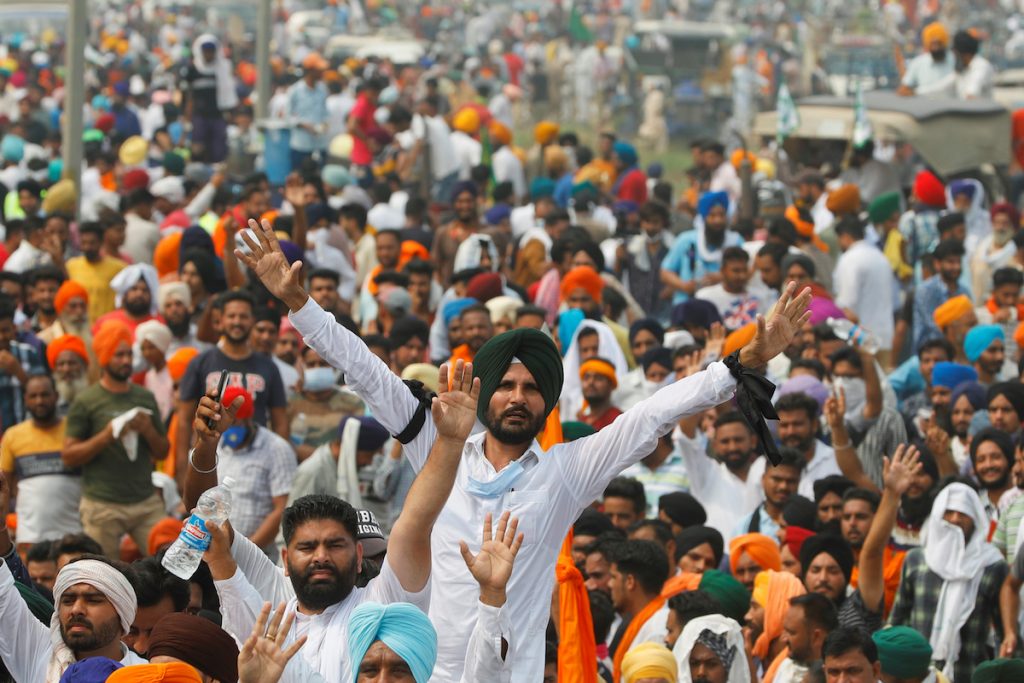Preetam Kumar, a Christian wheat farmer from India’s northern state of Bihar took part in the nationwide farmers’ protest on Sept. 25 against new laws that they fear will disadvantage millions of people dependent on the country’s fraught farming sector.
Kumar said farmers are disgruntled over the controversial laws passed on Sept. 20 by the federal government which change how farmers operate in the country. He said the laws are unfair and favor corporations.
“These corporate houses will now be regulating prices and will have a monopoly over everything from now on,” Kumar told LiCAS.news.
Such laws, critics say, weaken a support system for India’s struggling small farmers. There are likewise concerns that the government is seeking to abolish the legal guarantee of a minimum price for what farmers produce.
But the federal government — led by Hindu nationalist Bhartiya Janata Party — has said the country’s so-called mandi system will continue, and they will not withdraw the Minimum Support Price (MSP), reported the BBC.
Backed by pro-reformists economists, the country’s Prime Minister Narendra Modi has described the laws as a “watershed moment” in reforming Indian agriculture.
Half of India’s 1.3 billion population are directly involved in farming while as much as 30 percent of the populace is associated with it through indirect means such as the sale of fertilizers, transportation, and sale of produce.

However the country’s agricultural sector is seen by economists as being inefficient. The Organization for Economic Co-operation and Development (OECD) said the average yields in India are low compared to other global producers.
Apart from low productivity, India’s agricultural industry suffers from poor infrastructure and a high-level indebtedness which has pushed many farmers to suicide. From 1995 to 2016, a total number of 320,000 Indian farmers killed themselves due to being unable to repay bank loans.
Many farmers are now doubtful of the government’s intentions in reforming the country’s stressed agricultural sector. While the need for reform of the agricultural sector has long been sought, the negative impact of the new laws on India’s already struggling rural communities is feared to be immense.
Kumar said that poor farmers are being left to fend for themselves. “We will hit the streets and continue to remain on roads unless the government doesn’t roll back these laws,” he said.
Joining Kumar and other farmers on the nationwide strike were farmer organizations, unions and political parties.
Christian activist and lawyer, Allen Francis, from the southern Indian state of Bangalore, said small farmers will be exposed to the volatility of a “brutal market”.
“Instead of supporting the farmers wrecked by climate change and other factors, the government is corporatizing the sector without compunction,” Philip said.

Pratab Singh, a Christian who owns three-acres of land in the Indian state of Punjab, fears that if the new farm law is not revoked, farmers will find themselves in devastating circumstances.
“These new laws will eat us away,” said Singh who added he wouldn’t stop striking until the laws was rolled back.
Michael Philip, a Christian activist from India’s western state of Maharashtra said the government damaged India’s farm sector in 2016 during a “cash crisis” created by a demonetization program that scrapped 500 and 1,000 rupee notes.
“It caused widespread losses in every business, but farming was the worst hit,” Philip said. “Farmers couldn’t sell their produce for months and had to incur heavy losses,” he said.
“Now amid COVID-19 crises which have plunged the country into distress, the farm bills look like the last nail in the coffin of the ailing farming sector. It has to be opposed. There is no other way,” Philip said.






